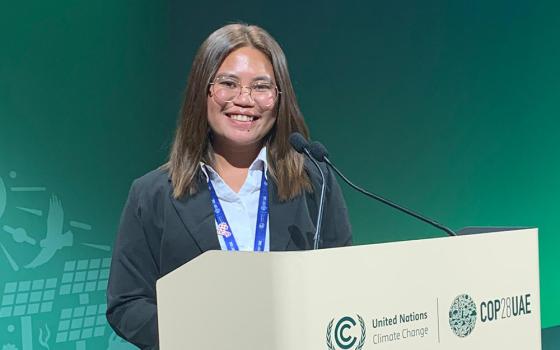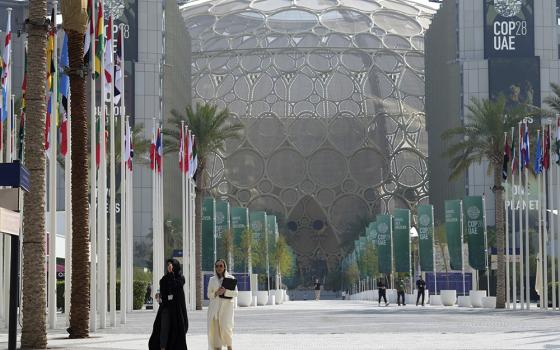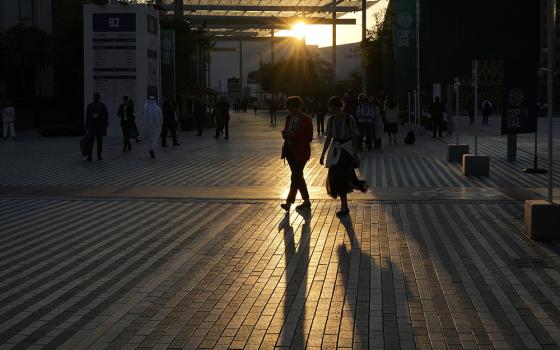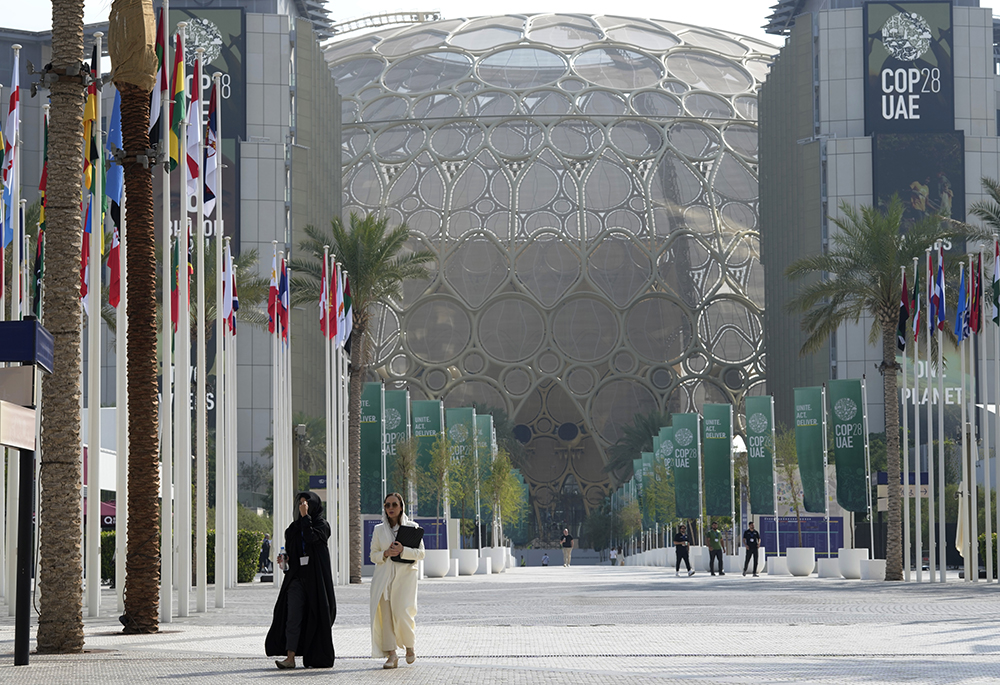
People walk through the COP28 U.N. climate summit Dec. 13 in Dubai, United Arab Emirates. (AP photo/Peter Dejong)
Nearly 200 countries at the United Nations climate summit in Dubai agreed for the first time to shift away from fossil fuels, the primary driver of rising global temperatures, as part of efforts to prevent catastrophic impacts from climate change.
The agreement signaling "the beginning of the end for the fossil fuel era" was reached early Dec. 13, nearly 24 hours after the scheduled end of the COP28 climate conference held in the United Arab Emirates, a top oil-producing nation.
While COP28 president Sultan al-Jaber and others in the final plenary session hailed the deal as a historic breakthrough, Catholic officials present at the U.N. summit had mixed reactions.
They saw the commitment to a transition from fossil fuels as an important step, but also expressed disappointment that the language was diluted and the document contained loopholes. Overall, they said it lacked urgency in meeting what science says is necessary to stave off suffering for millions of people from more extreme storms, sea rise, droughts and heat waves.
Addressing the summit as it drew to a close, Archbishop Christophe Zakhia El-Kassis, the Holy See's nuncio to the UAE leading the Vatican delegation, expressed the delegation's "concerns that the expectations of the youth and future generations, especially those of the people living in the areas mostly affected by climate change, have not been completely met, and that there was not a full response to the science."
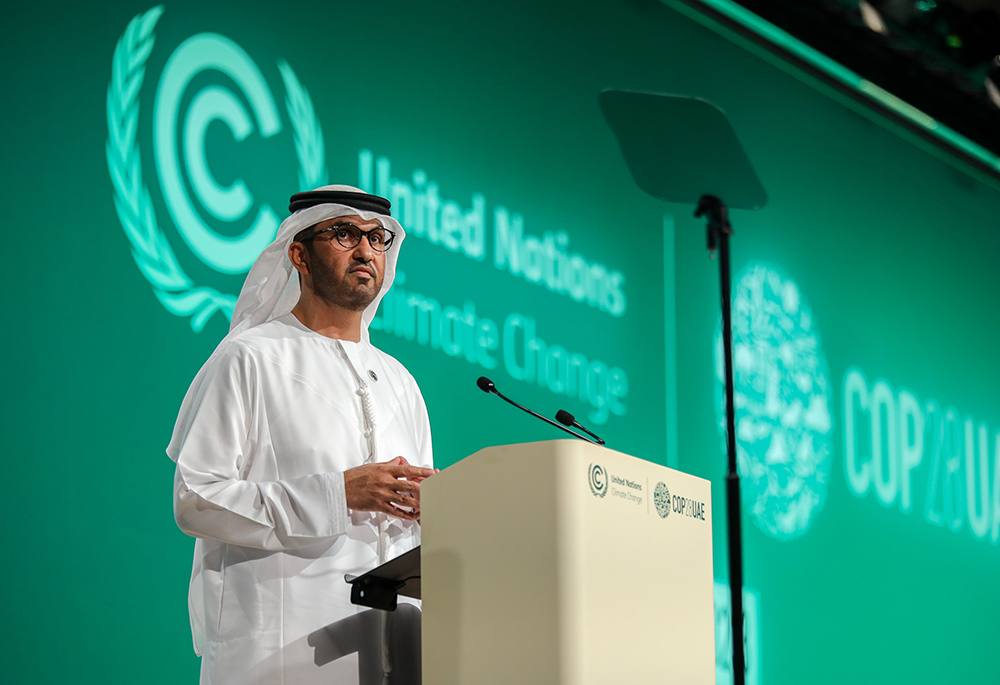
Sultan Ahmed al-Jaber, the president-designate of COP28, speaks during the formal opening of the U.N. Climate Change Conference at Expo City Nov. 30 in Dubai, United Arab Emirates. (CNS/Courtesy of UN Climate Change COP28, Mark Field)
A deal to distance from fossil fuel energy
At the center of COP28 was the global stocktake, a multiyear process to assess progress nations had made in meeting the 2015 Paris Agreement goals, namely limiting global temperature rise to 1.5 degrees Celsius (2.7 degrees Fahrenheit) — a level scientists say exceeding could trigger irreversible tipping points and put millions of people at greater risks of catastrophic climate-related impacts.
A U.N. report in September showed nations well off track from that goal, with global warming set to hit nearly 3 C by the end of the century, and reach 1.5 C as early as the 2030s. The stocktake process in Dubai was a chance for countries to respond with how they would get back on course, while also informing their next round of national climate pledges, due in 2025.
Over the two-week conference, diplomats and ministers negotiated what the final text would say on the future of fossil fuels. At one point, the head of OPEC urged its member nations, which include UAE, Saudi Arabia and other oil-producing nations, to block efforts at the summit to limit fossil fuel production. Island nations led a counter-push, saying they would not agree to a deal that would amount to a death sentence.
In the final text, named the UAE Consensus, nations recognized that limiting temperature rise to 1.5 C will require "Transitioning away from fossil fuels in energy systems, in a just, orderly and equitable manner, accelerating action in this critical decade, so as to achieve net zero by 2050 in keeping with the science."
That wording was the first time in the nearly 30-year history of international climate negotiations that nations agreed to move away from fossil fuels in a final document.
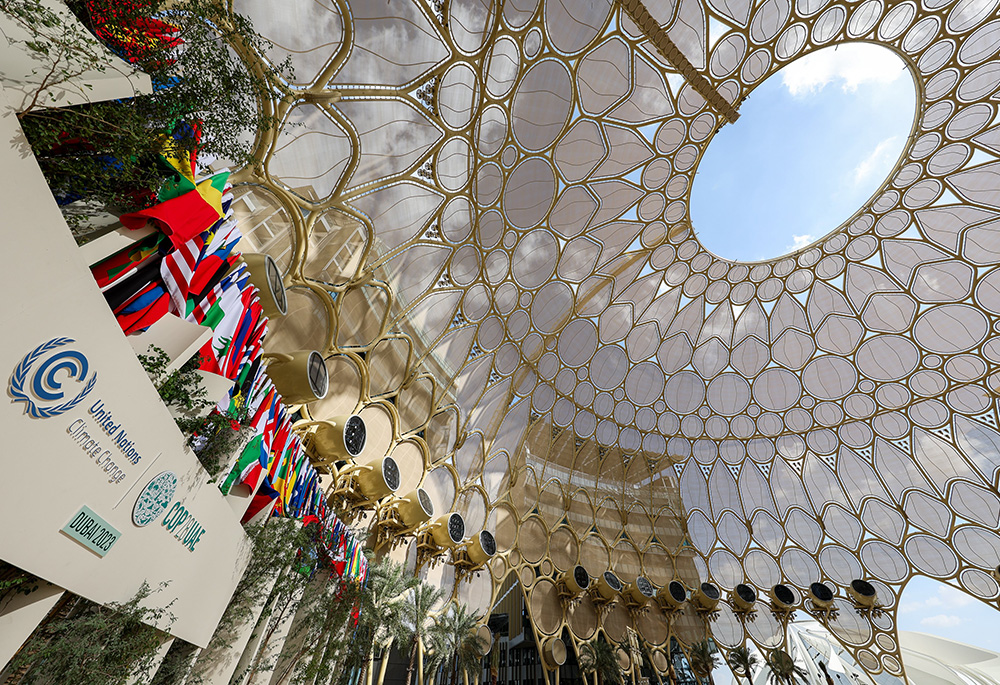
A view of Al Wasl Dome and an array of flags can be seen during the U.N. Climate Change Conference COP28 at Expo City Nov. 30 in Dubai, United Arab Emirates. (CNS/Courtesy of UN Climate Change COP28, Neville Hopwood)
The text also calls for "the phase-down of unabated coal power" and phaseout of "inefficient fossil fuel subsidies" — repeating positions reached two years ago in Glasgow — and for countries to triple global renewable energy capacity and double energy efficiency by 2030. In addition, it included language in support of nuclear energy, carbon capture and storage technologies and acknowledged the need for transitional fuels, a reference to gas.
Martin Krenn, advocacy officer for the Coordination Office of the Austrian Bishops' Conference for International Development and Mission, told EarthBeat that the fossil fuel language in the text, while not perfect, sends "a very significant signal to the world, also to private investors and industry that fossil fuels don't have a future."
While a milestone, the language around fossil fuels in the UAE Consensus was weaker than the full phaseout of fossil fuels that many island states, civil society groups, faith-based institutions and even Pope Francis had sought from the COP28 summit. Some, including more than a dozen Catholic organizations, called for a new treaty to be adopted to chart the end of the use of coal, oil and gas.
Josianne Gauthier, secretary general of CIDSE, a network of Catholic social justice organizations, said that while the text "illuminates the beginning of the end for the fossil fuel era … the outcome fails to fully reflect the urgency of climate action or the reality faced by the world's most vulnerable nations."
"Fossil fuel producing countries and wealthy western states have not shown the courage to overcome greed and their lifestyles. In doing this, we continue to ignore the demands from Indigenous peoples, youth movements, and vulnerable countries to abandon our addiction to fossil fuels in a way that is fair, fast, funded, and forever," she said in a statement.
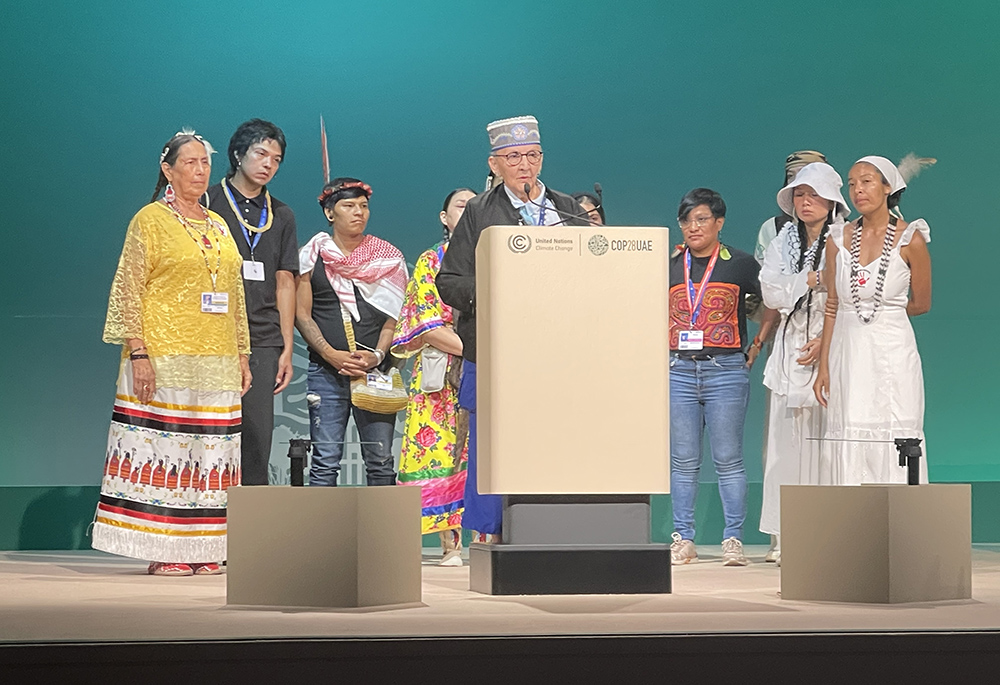
Indigenous people on stage during the People's Plenary Dec. 11 at COP28, the United Nations climate change conference, in Dubai, United Arab Emirates. At the microphone is Grandmother Mary Lyons, an Anishinaabe-Ojibwe Elder from Minnesota. (Courtesy of Catholic Relief Services)
Island nations, in a speech criticizing the quick adoption of the stocktake deal, said it didn't provide the "course correction" needed to keep the 1.5 C window open.
Numerous scientific reports have shown keeping the 1.5 C limit within reach requires global emissions to peak no later than 2025 and be cut 43% by 2030, 60% by 2035 and reach net-zero by 2050. While the stocktake text acknowledges this science, it doesn't provide a detailed path to achieving it, Lindlyn Moma, advocacy director for Laudato Si' Movement, told EarthBeat.
"The outcome fails to address the climate crisis with the seriousness it warrants, echoing Pope Francis' concerns about poor implementation and lack of oversight in previous accords," she said.
The pope had hoped to attend COP28 in person, becoming the first-ever pontiff to appear at a U.N. climate summit, but illness forced him to cancel the trip. Two months before the conference, Francis issued Laudate Deum, an apostolic exhortation "on the climate crisis" where he called for leaders in Dubai to demonstrate courage and seek solutions for the common good, including the elimination of fossil fuels.
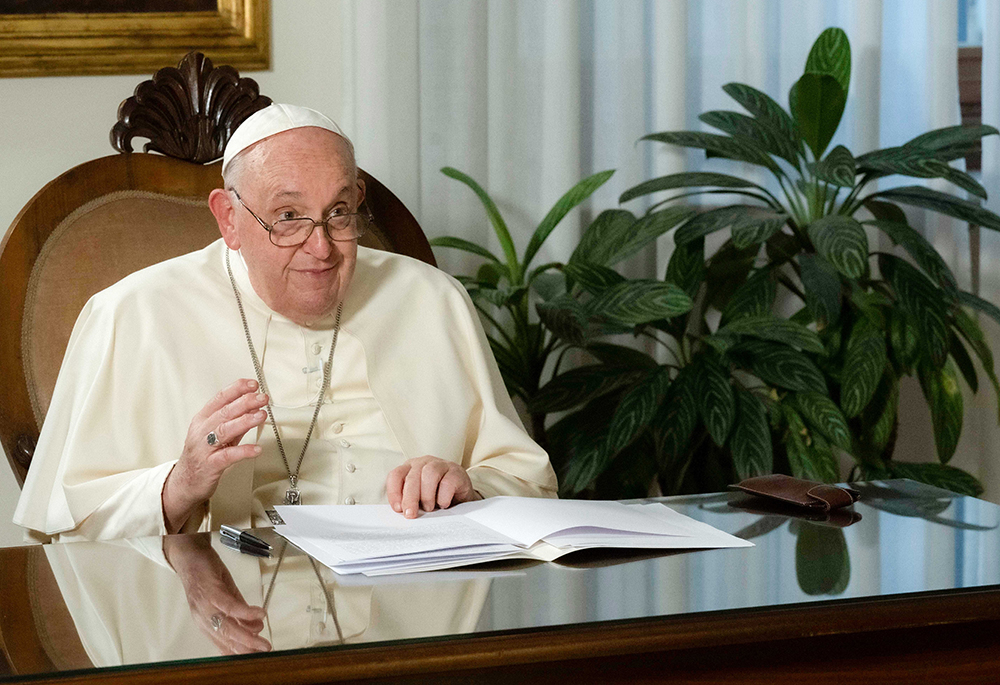
Pope Francis smiles after delivering his speech by video from the Vatican to religious leaders attending the inauguration of the Faith Pavilion at the U.N. climate change conference Dec. 3 in Dubai, United Arab Emirates. Pope Francis canceled his trip to Dubai because of a bronchial infection. (CNS/Vatican Media)
In his statement after the UAE Consensus was adopted, El-Kassis said that the pope's appeal in Laudate Deum — that world leaders "must move beyond the mentality of appearing to be concerned but not having the courage needed to produce substantial changes" — "sounds inspiring now more than ever."
"The goal is clear," he said. "Firstly, to accelerate climate action and transition away from fossil fuels in a just and equitable manner in this critical decade in order to keep 1.5 within reach. Secondly, to give hope and secure a livable common home for our children, where everyone everywhere can thrive."
"A lot of work is still ahead of us," the archbishop added. "And we have a duty towards those who rightly are demanding that we as leaders act in their name."
Climate funding, adaptation, resilience
Beyond the decision on fossil fuels and a blueprint for climate mitigation, COP28 delivered results in other areas.
On its first day, countries operationalized the loss and damage fund, which will provide financing to communities most impacted by climate change. Nations pledged more than $700 million to the new fund.
Jesuit Fr. Leonard Chiti called the agreement on the loss and damage fund "a very delicate victory."
Krenn, who followed the financing negotiations closely in Dubai, said the initial pledges are good but only a starting point, with some estimates placing loss and damage needs at $400 billion. He noted the fund's temporary housing at the World Bank is a concern for many developing nations and that the fund currently lacks any provisions about replenishing it.
Elsewhere on financing, the global stocktake text noted that more funding is needed generally, especially from developed countries to developing countries, and that the long-pledged $100 billion annually in climate funding has yet to be met.
Krenn said there are concerns about how industrialized nations will fill the gap in funding on the $100 billion pledge, which was set to be reached by 2020, and exactly how they will accomplish other pledges to double financing on adaptation.
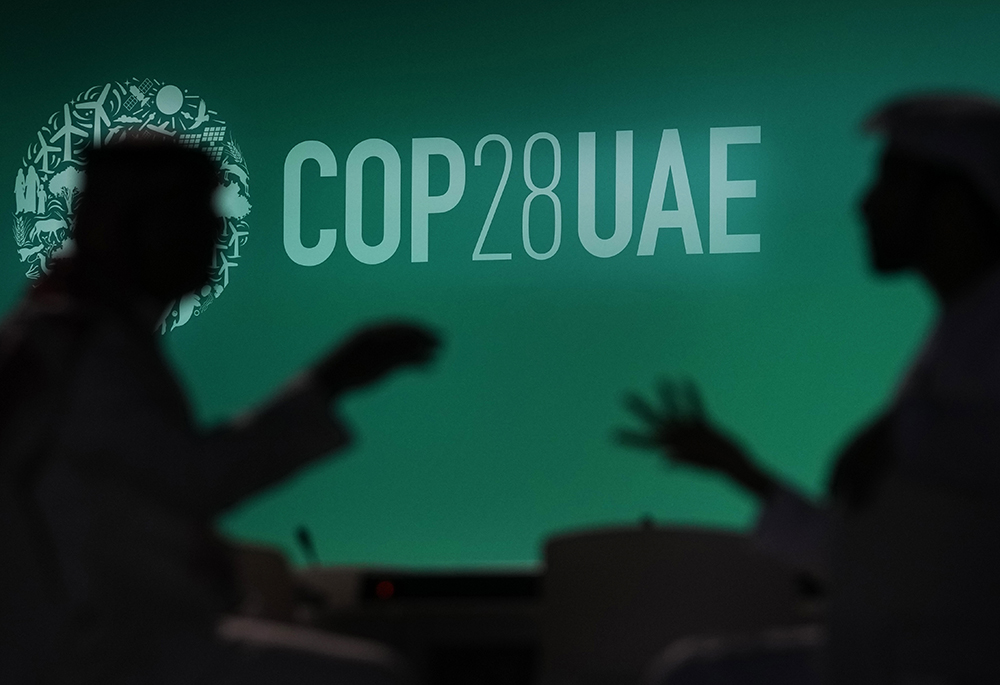
People are silhouetted against a logo for the COP28 U.N. climate summit, Nov. 29, in Dubai, United Arab Emirates. (AP photo/Rafiq Maqbool, File)
Nations also adopted a framework for a global goal on adaptation that directs countries to improve resilience to climate impacts on water and food scarcity, health, ecosystems and cultural heritage sites. Countries agreed by 2030 to conduct impact, vulnerability and risk assessments and develop national adaptation plans. They also established a two-year program to develop indicators to measure progress on climate adaptation.
Gina Castillo, senior climate policy adviser with Catholic Relief Services, told EarthBeat that they had hoped to see more specifics around adaptation targets and reductions in vulnerability to climate risks.
The intense focus on the global stocktake and the heightened attention on the loss and damage fund in the past two years has left adaptation somewhat marginalized, she said. CRS and other Catholic groups had hoped COP28 would signal a course correction.
"We are continuously supporting communities that need funding in order to be able to make those adjustments in their livelihoods that are going to help them manage these extreme weather events," Castillo said.
The global stocktake text also stated the importance of linking efforts to address both climate change and biodiversity loss — a priority for numerous Catholic and faith-based organizations — "as well as the vital importance of protecting, conserving, restoring and sustainably using nature and ecosystems for effective and sustainable climate action."
In Dubai, the locations of the next two U.N. climate summits were decided, with Baku, Azerbaijan to host in 2024, and Belem, Brazil in 2025.
Nations are required to submit new, more ambitious climate pledges, or nationally determined pledges, at least 12 months before COP30 in Brazil.
Advertisement
Catholic presence at COP28
More than 100 officials with Catholic institutions and organizations registered to attend the climate summit in Dubai, which drew an estimated 85,000 participants, by far the largest climate COP to date.
A majority were affiliated with Caritas Internationalis — the global Catholic Church's humanitarian aid network — and its national-level agencies, like CRS. Catholic youth organizations also had a strong presence. Boston College and Georgetown University each sent contingents of 20-plus students and professors.
An eight-member team was on the ground in Dubai representing the Holy See delegation, which participated for the second year as a full party to the U.N. Framework Convention on Climate Change and Paris Agreement. A total of 18 members had registered, including the pope.
This was the second time in three years that expectations were raised for an in-person papal intervention at a U.N. climate summit. In both cases, a proxy, Cardinal Pietro Parolin, attended instead.
The Vatican delegation aligned itself early behind the phaseout of fossil fuels and fossil fuel subsidies (estimated at $7 trillion globally), following the lead that Francis outlined in his address to COP28 and in Laudate Deum.
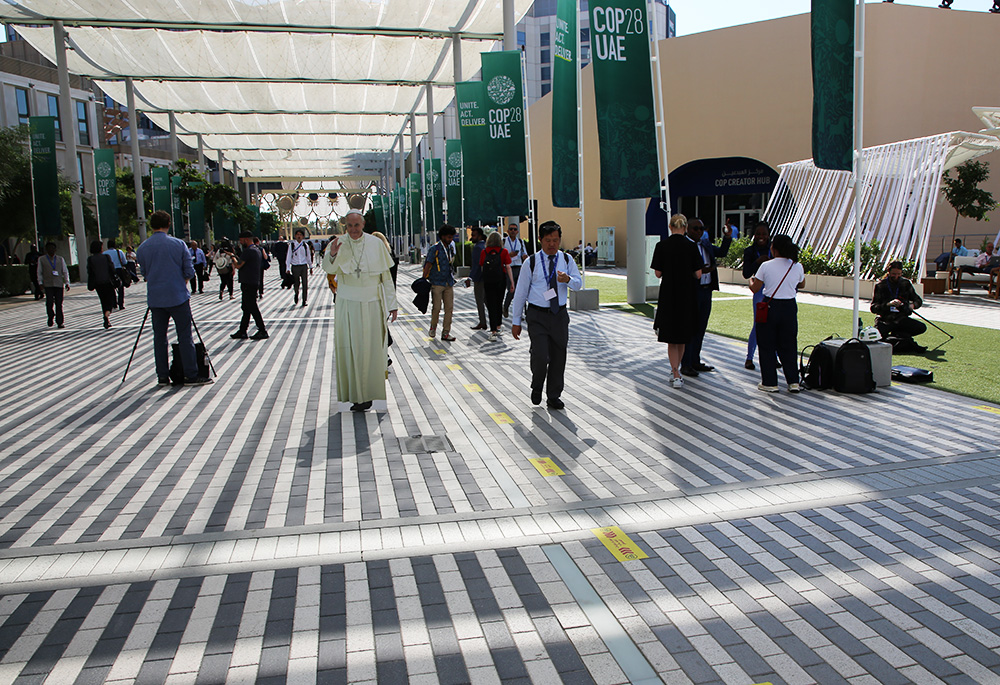
A cardboard cutout of Pope Francis stands in The Blue Zone near the Global Climate Action section at COP28 in Dubai, United Arab Emirates, Dec. 9. (Courtesy of Catholic Relief Services)
A particular focus for the Holy See delegation was greater emphasis on climate change education and lifestyle changes, reflecting the pope's belief, as stated in Laudate Deum, that "there are no lasting changes without cultural changes … and there are no cultural changes without personal changes."
The Holy See delegation at one point in the global stocktake negotiations proposed adding language into the final text that would have required nations to include and fund education on climate change within climate solutions in order to strengthen awareness and promote transitions to more sustainable lifestyles. Ultimately, the final texts did not include any references to education.
During the two weeks, the Vatican delegation met at least three times with Catholics present at COP28 where they received briefings on the delegation's work and offered input for their negotiations. In the waning days, Catholic officials formed a working group for a COP Catholic Actors Network in an effort to better organize and work collectively at future U.N. climate conferences.
The effort to elevate the Catholic voice in future COPs follows an increasingly visible presence of faith in the U.N. space. COP28 was the first-ever climate summit to host a Faith Pavilion — which Francis helped inaugurate via video message — and it followed a similar, though smaller, faith space at the COP15 U.N. biodiversity conference in Montreal in December 2022.
Castillo with CRS said that people of faith have an important role to play on climate change, to not only be a voice of hope in the face of apocalyptic forecasts around climate change but to remind individuals of the power they possess in pushing for solutions.
"We have that stronger role that we need to demand those in power to do more," she said. "And I think, again, that's an important message that the faith community brings to these conversations here on climate change."





